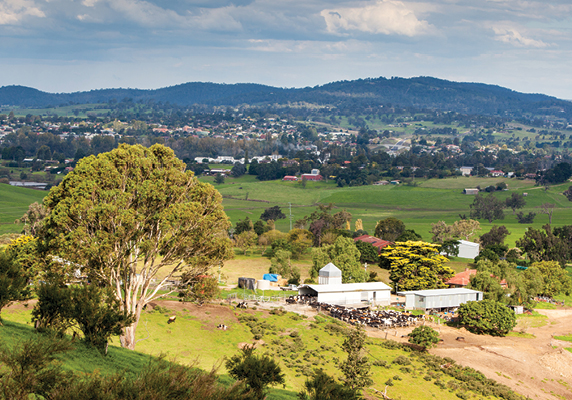After 2020, the new “sea change” or “tree change” has become a “COVID change” – that is, a move to the country spurred by the rapid uptake of remote working amid the global pandemic. We meet with some of the growing number of legal professionals swapping the hustle and bustle of the city for country life.
Amanda Farmer moved her law practice to Mudgee from Sydney earlier this year, and the principal of strata law firm Lawyers Chambers says she hasn’t looked back.
“Lifestyle here is slower, quieter and I’m lucky to be in a part of the country that is beautiful. There are a fewer people here and you feel like you’re less in the rat race,” says Farmer, who relocated to the town in NSW’s central west with her partner and young son.
“Mudgee’s also a tourist town, so on the weekend there are fabulous things to do. There are great restaurants and great wineries, and family and friends want to come and visit.”
Country towns ticking boxes
Farmer, who ran her practice from Sydney’s east for eight years before making the tree change to Mudgee, says the regional hub is both a great place to live with her family and has what she is looking for in terms of workability.
While she spends most of her time working remotely with city-based clients, she says a big bonus of her new hometown is its transport links back to the big smoke.
Given the town has an airport, she says it’s easy to organise a few days in Sydney each month for client meetings, and to do any other business that can’t be completed online.
“The airport means I can be in Mudgee most of the time, and in Sydney a few days every three or four weeks at the most. It’s 10 minutes away from us and there are six flights to Sydney per week, so it’s easy. I can be on the plane at 9am and in a meeting at 11am” she tells LSJ.
“[The airport is] 10 minutes away from us and there are six flights to Sydney per week, so it’s easy. I can be on the plane at 9am and in a meeting at 11am.”

Dean Katsavos, principal of Melbourne-based firm Parachute & Bridge, has also recently made a tree change. Katsavos, whose clients are typically professionals and SMEs in the property and construction sector, moved with his partner and young family to Mount Macedon, a small rural mountain village about an hour from Melbourne’s CBD.
He says a big reason for the move, made in late 2019, was a more comfortable family life.
“I had an office in the city, we were in the inner city, and we got to a point when the kids were getting older and we paused and wondered if there was something that we could do differently,” he tells LSJ.
“We’d always been a bit adventurous and happy to move around, and we liked to jump in the car on the weekend and go out to the regions instead of feeling like we were stuck in a townhouse with the kids growing up.
“We came out this way and found a school that ticked the box for us and that was the tipping point for us after that.”
Like Farmer, Katsavos points to his country town as being perfectly situated for a great lifestyle along with occasional trips into the city for face-to-face meetings with clients.
“Mount Macedon is an ideal location as depending on which client I need to get to: it’s 45 minutes to the Docklands and 55 minutes to the middle of the city.”
The mix of remote and in-person work also fits well with the nature of his practice, he says.
“I’ve set myself up as legal counsel services so typically I’ll join an existing internal legal team and support them or bring my toolkit along and be the internal legal function and interface with everything from CEO, CFO, governance manager or project teams.”
More white-collar workers going regional
The two lawyers are far from the only legal professionals opting for the country life.
A landmark report The Big Movers: Understanding Population Mobility in Regional Australia, released by the Regional Australia Institute last year, found across the two most recent census periods, between 2006-2011 and 2011-2016, more people moved to regions from capital cities than the other way around.
Between 2011-16, the report found 65,204 more people moved to regions (than the number moving to cities), while in 2006-11 the number was 70,493. Interestingly, the report also found that Sydney lost more millennial workers to the regions than it gained during that time period, with 36,973 young workers shifting to the country in the five-year period looked at by the report.
When it comes to reasons workers are making a tree or sea change, lifestyle ranks highly. On this point, according to a recent Regional Australia Institute poll, most respondents said reducing general stress and anxiety was a major driver for starting a life outside capital cities, while others cited less traffic congestion and cutting living costs as major factors.
Other respondents pointed to the extra living space in the regions as well as a greater connection to nature as reasons to shift. Another common driver was the increasing availability of flexible work options, like remote work, on offer in the wake of COVID-19.

“Up to 2020, you might have had a very hard time convincing anybody even theoretically that you could work from the regions and still do a city-based job effectively, but we’ve seen through the last year that for some people in certain roles, that is possible.”
Lawyers ideal candidates for country moves
Tony Matthews, a senior lecturer at Griffith University’s School of Environment & Science, describes lawyers as “knowledge workers” and says many of them are part of a small segment of the overall labour force who can make working from the country a reality.
According to Matthews, many lawyers share a set of professional characteristics that make them good candidates for regional moves, including no “on-site” attendance being required, and that they have high levels of expertise and qualifications valued by their employers.
“It’s quite a thin wedge of professionals who can do this,” he says. “Of the professionals that can, lawyers are right up there.”
He says while there has been a long-term trend towards more white-collar workers doing their jobs from outside cities, the pace of this shift has accelerated due to COVID-19.
“Up to 2020, you might have had a very hard time convincing anybody even theoretically that you could work from the regions and still do a city-based job effectively, but we’ve seen through the last year that for some people in certain roles, that is possible,” he tells LSJ.
“If you’re talking about lawyers, if you’re not going to court regularly – or at all – then that’s a big advantage straight away. Also, if you think about the legal profession, it has been a knowledge industry with a degree of centralised resources. Many law libraries and case law [resources] are all online now, you don’t need to be proximate to a law library – as you once had to be.”
Another trend, Matthews notes, is that lawyers in the private sector are more likely than their public sector counterparts to shift regionally. He says that may be because many law firms have discovered their bottom line can benefit from having a decentralised workforce.
“If you find out that a fair number of your workers can work just as well from home then you’re going to save money on office space,” he says.
Public sector lawyers, by contrast, are more likely to be corralled back to the office as part of government efforts to buoy urban economies. Governments across Australia, he argues, have seen that with a fall in city populations comes a drop in the economic output of cities, resulting in less rates being paid, and taxes collected. They don’t want this to continue.
“It makes it very difficult for the government to plan for things like public transport so you’re seeing public sector agencies trying to get people back to work.”

Employers enabling country moves
One private sector employer, Sam Almaliki, of online conveyancing firm Settle Easy, says he’s embraced remote working for his team of over 30 conveyancers and lawyers, with staff now working from home across areas including regional NSW, Victoria and Queensland.
Almaliki says, in his opinion, it’s important to focus on the standard of the service being provided to clients, instead of where staff are based.
“There’s this old thinking that lawyers and conveyancers need to be shackled to their desk to be productive and to do great work, but it’s a myth from another era,” he tells LSJ.
When it comes to service delivery, he stresses the centrality of online tools to keep far flung workers connected with each other and company management. In his case, he points especially to the company’s online platform that he says keeps staff performance high.
“It encourages quick turnaround through automation in terms of documentation, communication and transparency. If something is being delayed everyone can see it like the customer and the practice manager, which drives excellent service levels,” he says.
Rather than monitoring staff at desks, he puts the onus on workers, no matter where they’re located nationwide, to contact clients within two hours of receiving a new job.
Almaliki describes this as “more about driving behaviours rather than insisting on a nine-to-five” as part of the company’s overall approach to its culture. He contrasts this with what he sees as a big problem at many law firms – a mismatch between espoused values and reality.
“If you’ve got a worker who’s working continually to midnight, which is what a lot of law firms drive, they’re not a healthy, well-rounded person,” he says.
One of the firm’s team, Stephanie Duong, a new mum and lawyer who now works from Sydney’s greater west, says cutting out a CBD commute has been great for work-life balance.
Duong says the ability to work from home means, with a little planning, she is able to juggle looking after her infant daughter and her job without having to sacrifice on either.
“If I wasn’t working from home I would need to take her to day care which I was really not wanting to do, so working from home and actually being able to have flexible working hours and to be here for her is the best thing out of the whole situation,” she tells LSJ.
“There’s this old thinking that lawyers and conveyancers need to be shackled to their desk to be productive and to do great work, but it’s a myth from another era”

Going regional takes planning
While there are significant upsides for lawyers of a move to the regions, Lawyers Chambers’ Farmer urges those considering it to plan ahead. She says, in her case, it took several years to get to her practice to the point that it could sustain itself in the countryside.
“I have been building a practice over the last five years where I do a lot of what I do solely online. I practice strata law, solely dealing with all of the craziness that happens in apartment buildings, and I have a podcast and an online membership community,” she says.
“That’s because I had in my mind that I wanted to find a way to practice and to build a business that was leverageable without having to employ many lawyers and a large team, which is the traditional model of practice for lawyers.
“Traditionally, if you want to leverage then you’re a principal and you have to employ lawyers, do more work and it’s all a matter of trading enough time for enough money to have the life that you want.”




